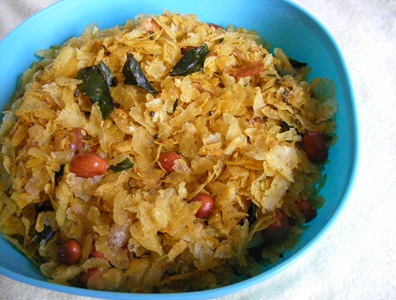I can not think of any other festival other than Diwali, where the spotlight is on the food. Agreed that it is supposed to be 'Festival of lights', after all the literal translation of Deepavali is 'A line of lights'. But still food has become the most important part of this festival too, as with so many others.
The preparations (read cooking!) start well in advance, sometimes with weeks still to go. The list of items made is endless if one has the time, energy & enthusiasm for it. In fact 'Faral' as these food items are collectively called, are sometimes the only dishes consumed during the odd 4-5 days. Faral for breakfast, Faral with lunch, Faral for evening snacks with Tea/Coffee, Faral again with whatevers made for Dinner. Atleast this was what was followed at my place.
Some of the main constituents of this Faral are
- Chivda, made mainly from Patal Pohe (Thin beaten rice) & may sometimes also contain murmura (puffed rice).
- Chakali
- Sev
- Ladoo, various types such as Besan(chickpea flour), Rava(Semolina), Rava-Besan, Nariyal(coconut) etc
- Shankar Pale both sweet & savoury
- Karanji
- Chirote
- Anarasa
What I have listed out here are some of the traditional Faral items. Other items such as Burfi, Gulab Jamun, Rasgulla, Halwa and anything else you can think of are additions based on individual taste.
Personally I like the savoury snacks better than the sweet ones. Give me Chakali anytime & I will happily munch away, but I have to be 'in the mood for sweets' if you offer me a Besan Ladoo!
I make Chivda very often to keep a snack handy, better than gorging on those potato wedges, crisps, fries etc. Since these items are readily available & its quite natural & easy to choose them whenever one feels like having a just a little something. So to avoid that I make Chivda & store it for such evenings. It even serves us as a breakfast item sometimes along with a dollop of curd which compliments the crunchy chivda very well.
Ingredients
- 250 gm Thin Beaten Rice (Patal Pohe)
- 3 tblsp oil
- 2 tsp mustard seeds
- 2 tsp Cumin seeds
- 12-15 curry leaves
- 1 tsp Hing (Asafoetida)
- 2 tsp Haldi (Turmeric powder)
- 2-3 tsp red chili powder
- 1-2 tblsp coarsely ground coriander seeds
- 1/2 cup peanuts and/or Dalia (roasted split chickpea)
- 1-2 tsp sugar
- salt to taste
Method:
Heat the oil in a large Kadai. Its very important to use a large kadai/ deep pan since you will need space to turn over the pohe from time to time.
Once the oil is hot, splutter the mustard & cumin seeds. Add the curry leaves & peanuts and fry for sometime.
Add the Hing, Haldi, red chili powder & ground coriander. If you dont have coriander seeds, you can use Coriander powder instead.
Mix everything properly on low flame, taking care not to let the masalas burn. Add the salt & mix well.
Add the Patal Pohe and mix till the Pohe are properly coated. Add in the sugar and mix. Check for salt & add some more if needed.
Continue to heat on low flame for approx 15-20 min and keep turning the pohe to roast them properly. This part has to be done very patiently. If you keep the flame high to finish it off quickly, you will get some burnt pohe & the rest will remain as they are. The key is to keep turning them every 3-4 min and do this on low flame.
To speed up things or rather to avoid standing & staring at the pohe as they get crunchy, pre heat the oven to 200 deg C. Rub the pohe with 2 tsp of oil and roast in the oven for about 8-10 min. Keep checking in between. Take them out once they are crunchy and proceed normally. Once the pohe are coated well with oil & masala from the phodni, the work is done, since they are already crunchy!
I have tried this & it really works but I still prefer the stove top method.
Turn off the flame and spread the chivda to cool.
Once cool, store in air tight containers. You can mix some baarik (thin) sev with the Chivda. Red Chili powder can be replaced with chopped green chillies, if you opt for that, add them along with the curry leaves and fry them too.
Chivda can be stored for as long as 3-4 weeks if stored properly in dry air tight containers.
You can also try making Mysore Pak from this blog, this Diwali!
Wishing everyone a very Happy Diwali!

wow you made chivda at home? how cool!
ReplyDelete